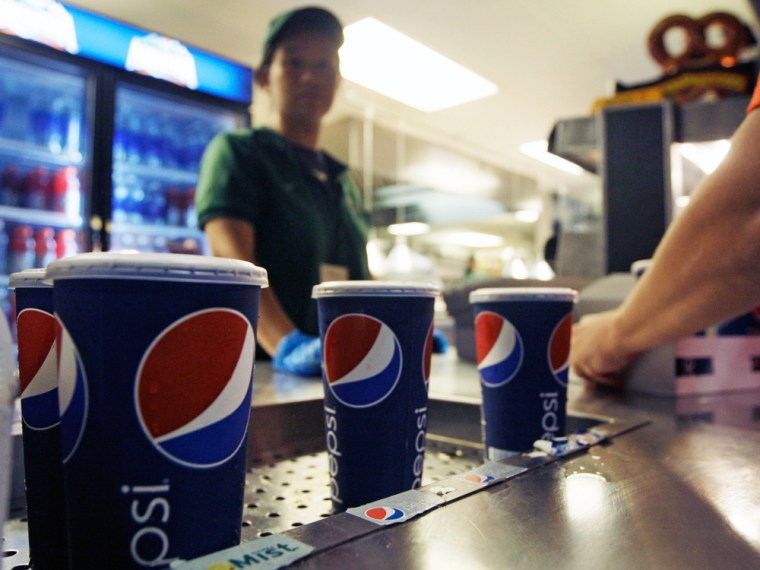The New York City Board of Health voted Thursday in support of the ban on large, sugary drinks on Thursday, in a controversial move to reduce obesity.
The ban is an unprecedented 16-ounce limit on sodas and other sugary drinks at restaurants, delis and movie theaters.
By a vote of eight members in favor, with one abstaining, the mayoral-appointed city health board outlawed sugary drinks larger than 16 ounces nearly everywhere they are sold, except groceries and convenience stores. Violators of the ban, which does not include diet sodas, face a $200 fine.
Opponents, who cast the issue as an infringement on personal freedom and called Mayor Michael Bloomberg an overbearing nanny, vowed to continue their fight, possibly by going to court in the hopes of blocking or overturning the measure before it takes effect in March.
"It's sad that the board wants to limit our choices. We are smart enough to make our own decisions about what to eat and drink," Liz Berman, a business owner and chairwoman of New Yorkers for Beverage Choices, said in a statement.
Health Commissioner Thomas Farley heralded the measure's passage as a major step toward making New Yorkers healthier and said it was likely to be copied elsewhere in the nation - and even the world - as were the city's bans on trans fats and smoking.
"This is a historic step to address a major health problem of our time," Farley said at the meeting immediately after the vote.
What do you think? "Nanny state" or smart way to fight obesity? Tell us on Facebook!
Farley recently said that if the law results in "shrinking only one sugary drink per person every two weeks from 20 ounces to 16 ounces, New Yorkers could collectively prevent 2.3 million pounds gained per year. This would slow the obesity epidemic and prevent much needless illness."
About one-third of Americans are obese, and about 10 percent of the nation's healthcare bill is tied to obesity-related diseases, such as Type 2 diabetes, heart disease and hypertension, according to the Organization for Economic Co-operation and Development.
The OECD projects more than two out of three people will be overweight or obese in some developed countries by 2020.
Doctors and nutrition experts said the regulation's success or failure may depend on more than just the modest number of calories it might slash from people's diets. It will hinge on whether the first-in-the-nation rule starts a conversation that changes attitudes toward overeating.
Since the mid-1970s, Americans have increased their daily intake by 200 to 300 calories while getting less exercise — a couch-potato lifestyle that has left the country with epidemic levels of obesity and diabetes.
While plenty of foods contribute to the problem, some experts believe soft drinks deserve a greater share of the blame, in part because the body doesn't scream, "I'm full!" when someone downs a 32-ounce soda, even though it has more calories than a typical fast-food cheeseburger.
The standard soda has gone from a 12-ounce can in the 1980s to a 20-ounce bottle today.
"This is the largest single driver of the obesity epidemic," said New York City Health Commissioner Dr. Thomas Farley. "It is the largest source of added sugars to our diet."
The math behind the ban is simple:
A 16-ounce Coke has 200 calories.
A 20-ounce Coke has 240 calories, or about 30 more than a Hershey bar.
If you drink a soda per day — as do 46 percent of Bronx residents, according to one recent Health Department survey — choosing the 16-ounce bottle rather than the 20-ounce would save you 14,600 calories a year, or the equivalent of 70 Hershey bars. That is enough to add about four pounds of fat to a person's body.
To burn off those extra calories, an average-size woman would have to walk about 340 miles.
New York City health officials aren't actually expecting an effect that large, in part because the ban doesn't apply to sodas sold in grocery stores or convenience stores such at 7-Eleven.
But if the average New Yorker decreased soda consumption from 20 ounces to 16 ounces only once every two weeks, that would still be enough to prevent roughly 2.3 million pounds of weight gain in the city every year, Farley said.
The rule, which will take effect next March, would have its biggest effect on fast-food joints like McDonald's, where a 16-ounce drink is considered a small. (A 21-ounce is a medium and a 32-ounce is a large.)
The new rules will be enforced through the city's existing system for inspecting restaurants. Restaurants with self-serve soda fountains will be restricted to giving out 16-ounce cups, but free refills will still be allowed.
McDonald's would not discuss the possible effect on soda sales or how it might reconfigure cup sizes. It issued a statement expressing displeasure with the proposed rule but declined to say whether it would fight it.
Some advocates for the beverage and restaurant industries have said they are contemplating suing to halt the ban.
"Public health issues cannot be effectively addressed through a narrowly focused ban," McDonald's said in its statement.
Many doctors would agree.
The rule, for example, doesn't apply to alcohol, which some studies have indicated plays a larger role in obesity among adults. Nor does it address the thousands of other things we eat that are terrible for us, such as potato chips or fries.
"Beverages are the low-hanging fruit," acknowledged Barry Popkin, a professor of nutrition at the University of North Carolina and an author of books on global obesity. "I don't believe that cutting the portions alone will do it all."
But he said the real importance of the rule is that it has started a national dialogue.
"The bigger effect is helping to continue to educate Americans about why we have to do this," he said. "There is a chance this is going to matter."
The Associated Press and Reuters contributed to this report
Related:
